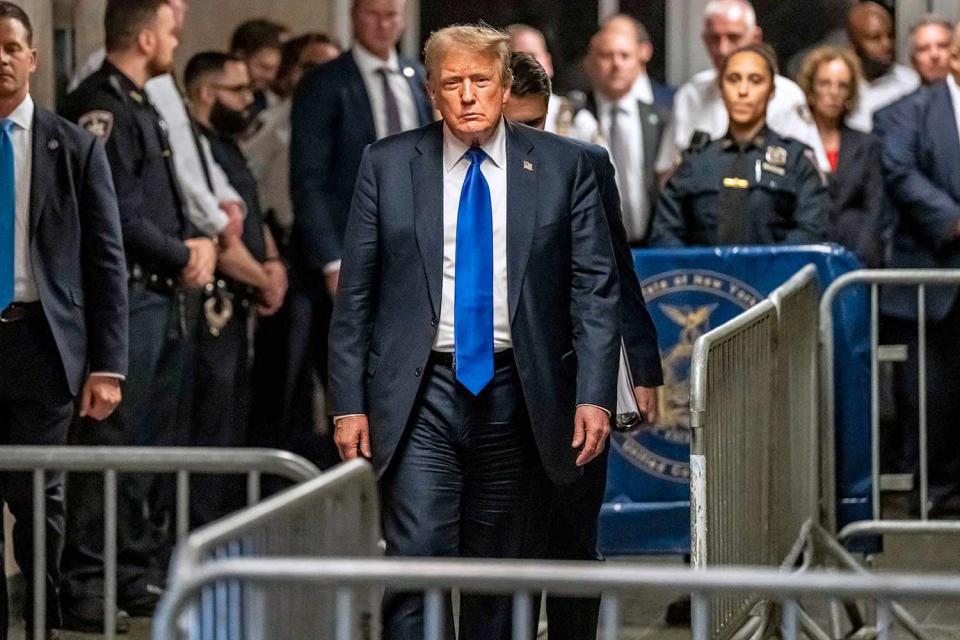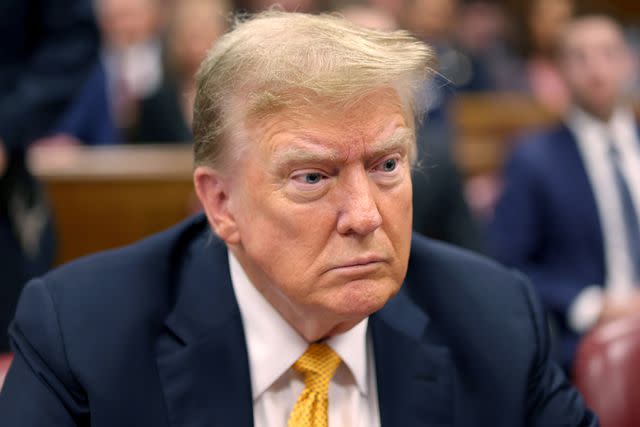Can Donald Trump Vote for Himself? Here’s What Florida Law Says About Felons
Trump's dueling titles of "convicted felon" and "presidential candidate" have many wondering whether he will even be allowed to vote for himself in November

Mark Peterson / POOL / AFP/ Getty
Donald Trump leaves the Manhattan criminal court after a jury convicted him on 34 felony counts on May 30, 2024Donald Trump's unprecedented status as both a convicted felon and major party presidential candidate poses a new question about whether he's eligible to vote for himself in the 2024 election.
Even if his guilty verdict on 34 felony counts sticks following an appeal, Trump will not be disqualified from running for president — the Constitution only requires that a candidate be at least 35 years old, a natural-born U.S. citizen and have lived in the U.S. for at least 14 years.
Whether he can cast a vote for the presidency is an entirely different story that largely depends on how he's sentenced on July 11.
Related: Is Donald Trump Going to Jail After Guilty Verdict? What to Know About Sentencing on July 11

Michael M. Santiago/Getty
Donald Trump sits inside a Manhattan courtroom on May 21, 2024, as his criminal trial stretches into its sixth weekTrump is now a full-time Florida resident, meaning Florida decides whether he's eligible to vote as a convicted felon.
Florida statute 97.041(2)(b) says that "a person who has been convicted of any felony by any court of record" is stripped of their voting rights. In cases like Trump's, where the crimes were not violent in nature, convicted felons can restore their right to vote after completing their sentence and paying off all fines.
But according to Michael Morley, director of Florida State University's Election Law Center, there's another layer to Trump's voting eligibility, because he was convicted in New York, not in Florida.
For residents who were convicted out of state, Florida defers to that state's disenfranchisement guidelines. In other words, if New York would disqualify Trump from voting, then Florida will too.
New York's current law, which was updated in 2021, allows convicted felons to vote so long as they aren't actively incarcerated. Therefore, Trump's eligibility to vote depends on how he's sentenced — and how quickly that sentence is enforced.
Related: Donald Trump Expected to Appeal Guilty Verdict, Which Could Delay His Sentence

Brandon Bell/Getty
Donald Trump at a New Hampshire campaign rally on Jan. 16, 2024As it stands now, Trump faces up to four years in prison for his crimes. (Technically he faces up to four years per count, but the sentences would run concurrently to avoid giving him 136 years in prison for a non-violent crime.)
New York Judge Juan Merchan also has the option to give Trump a lesser sentence of probation and/or a fine, which is the more likely outcome.
Several factors play into sentencing considerations, and while Trump has spent negative energy trying to get on the court's good side, Merchan is expected to treat the former president like he would with any other defendant in the same situation. That means he'll be taking Trump's age, family and criminal history into account.
As a 77-year-old and first-time offender, particularly one whose charges were relatively white-collar in nature, Trump has a strong chance of avoiding the maximum penalty. Merchan's challenge will be determining a sentence that is stern enough to deter Trump and others from committing similar crimes in the future, but reasonable enough to show he is acting without bias.
Merchan will hear Manhattan prosecutors' sentencing recommendation on July 11, then make the final decision himself.
Never miss a story — sign up for PEOPLE's free daily newsletter to stay up-to-date on the best of what PEOPLE has to offer.
If Trump is not sentenced to prison time, he will retain his eligibility to cast a ballot for president in November. If he is sentenced to prison time but allowed to wait until his appeal is decided on, he may also still be able to vote if the appeals process has not concluded before Election Day.
The only way Trump will lose his ability to vote for himself for president is if he is both sentenced to prison and actively behind bars on Nov. 5.
For more People news, make sure to sign up for our newsletter!
Read the original article on People.


